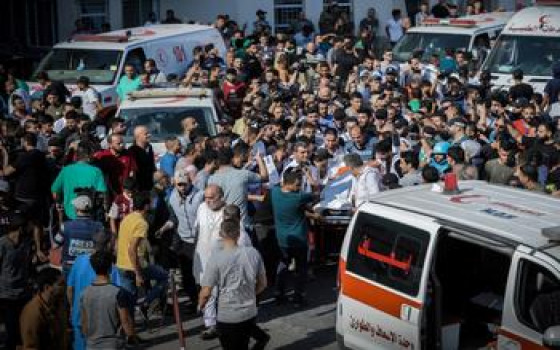
WHO welcomes Gaza ceasefire, warns of war impacts in Sudan

- Europe and Arabs
- Tuesday , 4 February 2025 6:49 AM GMT
Gaza - Khartoum: Europe and the Arabs
The Director-General of the World Health Organization, Dr. Tedros Adhanom Ghebreyesus, expressed his pleasure at seeing the ceasefire agreement in Gaza hold, expressing his hope that 2025 will bring an end to the conflicts in Sudan and Ukraine.
In his speech at the opening of the 156th session of the Executive Board of the organization yesterday, Monday, Dr. Tedros expressed his hope that the ceasefire in Gaza will turn into a lasting peace. He explained that the priorities are to meet acute health needs, support the operation of hospitals and primary care facilities, and transport patients in and out of Gaza to receive specialized care.
He said that since the ceasefire began, the World Health Organization has sent 63 trucks loaded with supplies, "and 30 more trucks are expected to arrive in the coming days." He added that the organization provides 60 percent of all medical supplies and 100 percent of fuel to hospitals and emergency medical teams facilities in total. During the conflict, the organization coordinated the deployment of 52 emergency medical teams from 26 organizations, which conducted more than 2.4 million medical consultations, over 36,000 emergency surgeries, and treated nearly 86,000 trauma cases, he explained. He pointed out that the organization and its partners negotiated humanitarian truces and prevented the return of polio by vaccinating more than 550,000 children.
The effects of war in Sudan
The Director-General of the World Health Organization spoke about the situation in Sudan, saying: “I visited Sudan in September, where I saw the effects of civil war and met people who are paying the price.”
He referred to his visit to Chad, where he traveled to the border town of Adré and met some of the 900,000 Sudanese refugees who fled in search of security and food, adding: “These are a small fraction of the 122 million people worldwide who have been forced to flee their homes.”
Attacks on health care
He touched on attacks on health care in Gaza, Lebanon, Sudan, Ukraine and elsewhere, noting that they have “become the new normal of conflict.”
He said that last year, the organization verified more than 1,500 attacks on health care in 15 countries and territories, resulting in 932 deaths and 1,767 injuries.
He added: “It is disappointing that almost no one is held accountable for these violations of international law. That is why we, with our partners, launched a new report last year that includes nine recommendations to hold accountable those who commit attacks on health care. We urge Member States to implement these recommendations.”












No Comments Found